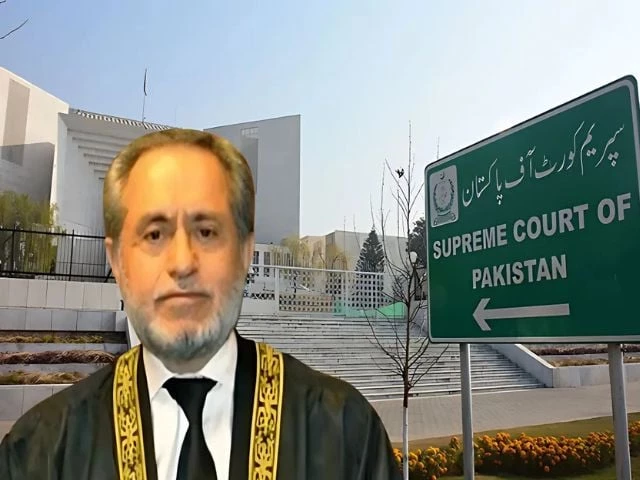ISLAMABAD:
A subcommittee of the Judicial Commission of Pakistan (JCP) headed by Justice Jamal Khan Mandokhail failed to evolve criteria for selecting judges for constitutional benches (CBs) as most members held the view that the Constitution does not empower it to do so.
The five-member committee held a meeting on Thursday, August 21. Other members included Attorney General for Pakistan (AGP) Mansoor Awan, Senator Farooq H Naek (from treasury benches), Senator Ali Zafar (from opposition benches), and Pakistan Bar Council (PBC) representative Ahsan Bhoon.
Chief Justice of Pakistan (CJP) Yahya Afridi had earlier formed two committees led by Justice Mandokhail to prepare draft rules for the annual judicial performance evaluation of high court judges, as well as criteria for selection of judges for the CBs.
According to sources, during the Thursday meeting committee members deliberated about the proposed rules for evolving criteria for the selection of CB judges.
They said three members — AGP Awan, PBC’s Bhoon and Senator Naek — opposed the framing of rules citing constitutional prohibition.
Senator Ali Zafar dissented with the majority opinion. He was of the view that the rules must be framed to regulate the discretion of the JCP members. Despite lengthy discussion, majority members were not convinced about the framing of rules. Later, the matter was referred to the JCP again.
Lawyers are divided on framing of rules.
A senior lawyer argued that rules must be framed in light of several Supreme Court judgments. However, the government is expected to secure a majority in the JCP to oppose the move for framing criteria to select judges for constitutional benches.
Since the enactment of the 26th Constitutional Amendment, judges for the Supreme Court and the Sindh High Court’s constitutional benches have been appointed without a structured selection process.
There is a perception that the government has been successful in excluding senior judges who may question the government in any high-profile case from the CBs.
The government has been fully satisfied with the performance of the Supreme Court’s CB, which upheld the trial of civilians in military courts, approved the transfer of judges from different high courts to the Islamabad High Court, and overturned the SC ruling that had granted PTI reserved seats after the 2024 general elections.
Lawyers have also raised questions about the wisdom and logic behind the nomination of a particular set of judges to the CBs, pointing out that judges perceived as critical of the present regime are often excluded.
Advocate Rida Hosain expressed surprise that a judge elevated only a few days ago could be nominated to a CB, while several senior Supreme Court judges with extensive constitutional expertise were not. In the absence of clear criteria, she noted, such nominations appear arbitrary.
She said the government’s interpretation of the Constitution is both self-serving and wrong. “There is nothing in the 26th Amendment which stops the framing of rules for nominating judges to the CBs.
In fact, the government’s position endorses the case against the 26th Amendment. The government believes that there should be absolute discretion in nominating judges, effectively allowing judges to be nominated for entirely political reasons that have nothing to do with competence.”
Rida stated that the government will have to justify the nominations that have been made so far.
“Why was Justice Ali Baqir Najafi nominated to the CB the same week he took oath in the Supreme Court? Why has Justice Aminuddin Khan been nominated the head of the CB? Why are senior judges with significant constitutional experience being excluded? The government members of the JCP have no answer to these questions, and therefore do not want to frame criteria,” she said.
The lawyer said framing objective criteria would require transparency and fairness. In the post-26th amendment judicial era, she said, the executive is not interested in transparency or fairness as it seeks to control the judiciary.
Soon after the passage of the 26th Constitutional Amendment, SC senior puisne judge Syed Mansoor Ali Shah had called for establishing clear guidelines for nominating and determining the number of judges on the CBs.
“The commission has already nominated and determined a number of judges of the Supreme Court and the Sindh High Court for the CBs in the absence of any mechanism or criteria in place,” Justice Shah wrote in a nine-page letter to the JCP secretary in December last year.
“Therefore, there has been no logic or reason backing the nomination and determination of the number of judges for the CBs.” He said nominations under Articles 191A and 202A of the Constitution cannot be made in a vacuum, and that the JCP must first establish objective criteria through the proposed rules.
Justice Shah suggested that such criteria could include the number of reported constitutional judgments authored by a judge, including dissents or additional notes, while serving on larger benches that heard significant constitutional cases
No rules have been framed for regulating CBs practice and procedure.
Article 191A (6) says that notwithstanding anything contained in the Constitution but subject to law, the judges nominated under clause (1) may make rules regulating the practice and procedure of the CBs.
This provision reflects that CB judges will frame rules regarding the regulation of the benches.
However, Justice Aminuddin Khan said the word “may” has been used in that provision, which shows that rules framing is not mandatory.
According to the Supreme Court’s November 20, 2024 press statement, the SC registrar was tasked to prepare draft rules regulating the practice and procedures of the CBs in consultation with Justice Muhammad Ali Mazhar, with the final draft to be reviewed by the committee for approval.
It is learnt that one SC judge had contended that new rules should be approved by the CB judges.

